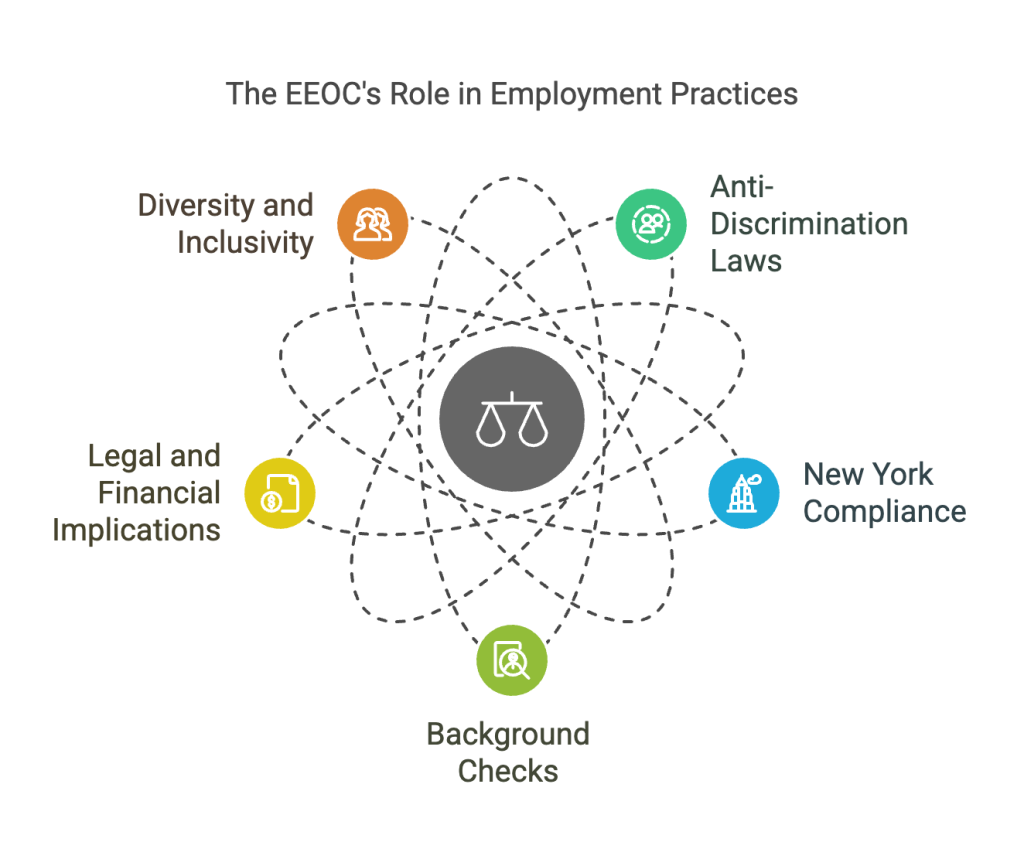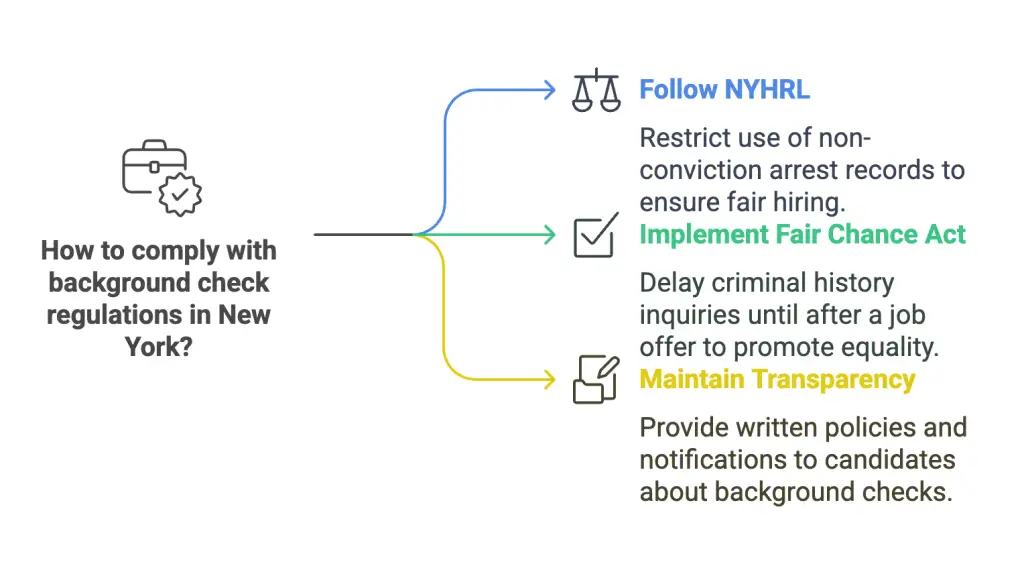Navigating the landscape of background checks can be tricky, especially in a bustling state like New York, where regulations and laws are as dynamic as the city itself. At the heart of these regulations lie the EEOC guidelines, a critical piece of the puzzle for both employers and employees. Understanding these regulations is not just about compliance—it's about fairness, transparency, and creating a trusting work environment.
This guide will walk you through all you need to know about EEOC background check regulations in New York, offering valuable insights into the processes, key considerations, and best practices.
Key Takeaways
- Understanding EEOC background check regulations in New York is crucial for creating a fair hiring process and protecting both job seekers and employers.
- The EEOC ensures that employment practices do not discriminate against any protected groups and that background checks remain fair.
- New York has specific rules, such as restrictions on using non-conviction arrest records and the "ban-the-box" policy in NYC, which differ from federal guidelines.
- Employers should obtain informed consent and apply consistent standards for all candidates, while job seekers need to know their rights and privacy protections during the hiring process.
- Success in implementing these regulations involves clear policies, thorough staff training, and learning from case studies to avoid potential legal pitfalls.
Introduction
Understanding EEOC background check regulations in New York is crucial for both employers and job seekers. Why? Because these regulations shape how information is gathered and used during hiring. Compliance ensures a fair hiring process and protects against legal pitfalls. For employers, knowing the rules can help foster trust and transparency. It also helps in building a diverse workforce by preventing discrimination. For job seekers, awareness of these regulations empowers you to know your rights and what to expect during the hiring process.
The purpose of this guide is to simplify New York's complex background check regulations. You will get a clear view of what both the EEOC guidelines and New York-specific rules mean for you. By the end, you should feel more confident navigating this often confusing landscape.
The EEOC and Its Role
The Equal Employment Opportunity Commission, or EEOC, plays a pivotal role in shaping fair employment practices. Established in 1965, the EEOC enforces laws that make it illegal to discriminate against job applicants or employees based on race, color, religion, sex, national origin, age, disability, or genetic information. Their scope includes ensuring that background checks do not unfairly impact these protected groups.

In New York, complying with EEOC regulations is essential for employers. The laws here intersect with EEOC guidelines in ways that demand careful application. Non-compliance isn't just a legal risk; it also impacts your company's reputation. Employers must ensure their background check practices align with both EEOC directives and New York’s specific requirements, such as the New York Fair Chance Act.
For employers, understanding the EEOC's role is about more than avoiding lawsuits. It’s about fostering a hiring process that encourages diversity and inclusivity. Missteps here can lead to claims of discrimination, which have serious consequences, both legally and financially.
By adhering to EEOC guidelines, you support a fair hiring landscape. This commitment not only minimizes your legal risk but also boosts trust with potential candidates. Are your current practices EEOC-compliant, or are you leaving your company exposed to possible challenges?
Background Check Regulations in New York
New York follows specific rules that are more stringent than federal guidelines when it comes to background checks. While the federal government sets certain standards through the Fair Credit Reporting Act (FCRA) and the EEOC guidelines, New York adds its own layers, aiming to protect both employers and employees.
First, let's look at the New York Human Rights Law (NYHRL). Unlike many states, New York restricts the use of arrest records that did not lead to convictions when making hiring decisions. This state law causes a significant deviation from federal guidelines, where such records could be considered. In practice, this means you cannot consider an applicant’s arrest record unless it leads to a conviction or involves pending criminal cases.
Another distinctive regulation is the New York City Fair Chance Act. This law goes a step further than state or federal rules by enforcing a "ban-the-box" policy. Employers in New York City can't ask about criminal history until after a conditional job offer has been made. This ensures that candidates are first judged based on their skills and qualifications.
New York also requires a written policy on the use of background checks, made accessible to all employees and applicants. If you're an employer, you need to inform the candidate in writing if any adverse action is taken as a result of their background check. This helps maintain transparency and provides employees with a chance to dispute incorrect information.

In summary, navigating New York-specific regulations involves understanding both federal and state standards. If you live or hire in New York, be prepared for a more detailed process, and make sure your checks comply with both sets of rules. Familiarizing yourself with these distinctions not only ensures compliance but also promotes a fairer and more equitable hiring process.
The Process of EEOC-Compliant Background Checks
For Employers
Before you start conducting background checks, gather all necessary documentation. This might include job descriptions, company policy documents, and criteria for evaluation. Your aim is clarity and consistency from the outset. Next, you'll need informed consent. Make sure applicants know about the checks. This means obtaining clear, written permission before proceeding. Document this step carefully.
Consistency matters. Apply the same background check criteria to all candidates for the same role. If you check one accountant's credit history, check them all. Consistency prevents claims of discrimination later.
For Employees
You have rights during the background check process. Employers must inform you if your background is a factor in their decision. If a negative result comes up, they should follow specific protocols. This includes giving you a copy of the report and explaining your rights to dispute errors through the Fair Credit Reporting Act.
Your privacy is protected. Employers can't ask for information that isn't relevant to job performance. Enforcement of personal data protection is strict under EEOC guidelines. If you feel your rights are compromised, you can report it.
Best Practices for Employers
Clear policies on background checks are essential. They should be documented and easily accessible. This clarity helps everyone involved know what to expect and ensures checks are conducted without bias.
Training HR staff is crucial. They need to grasp EEOC regulations thoroughly to enforce them effectively. Consider regular workshops or online courses to keep up with any updates in laws or best practices.
Record keeping should not be overlooked. Maintain detailed records of each background check process. This can help resolve disputes and shows compliance with both state and federal regulations if questioned.
By implementing these practices, you can streamline your hiring process and uphold compliance, fostering trust and transparency both within your organization and with your job candidates.
Common Challenges and How to Overcome Them
Interpreting EEOC guidelines isn't always straightforward. They are often broad, making them hard to apply to specific situations. As an employer, the challenge lies in reading between the lines and figuring out how these guidelines apply to your procedures. The solution is to keep updated on EEOC clarifications and consult legal professionals when uncertain. Regularly check the EEOC website for updates or take part in webinars and workshops that discuss these nuances.
Balancing compliance with practical hiring needs can also be tough. On one hand, you want to hire quickly and efficiently. On the other, you must not skip necessary checks or ignore legal requirements. The best way to handle this is to design a streamlined process that incorporates all necessary steps without causing unnecessary delays. Create a checklist that outlines each stage and stick to it for every candidate. This ensures fairness and consistency while being practical for your timeline.
Case Studies
Understanding real-world applications of regulations enriches our grasp of complex rules. Consider a New York-based company, Tech Innovations, which successfully implemented EEOC background check regulations. By prioritizing clarity and transparency, they established consistent procedures rooted in EEOC guidelines. They trained their HR team diligently, ensuring everyone understood the intricacies of legal compliance. When screening applicants, they prioritized informed consent and maintained consistency, leaving no room for discrimination.
On the flip side, let's explore a retail chain that faced challenges. They stumbled by neglecting the importance of consistency, resulting in a discrimination lawsuit. A lack of training left their personnel interpreting guidelines haphazardly, leading to inconsistencies in applicant treatment. This case underscores the importance of clear policies and thorough training.
These cases show the importance of adhering to EEOC guidelines. By learning from these examples, you can navigate New York's regulations effectively, avoiding pitfalls and fostering a fair hiring environment. Are your processes aligned with these successful practices? If not, it may be time to re-evaluate your strategy.
Conclusion
Understanding EEOC background check regulations is essential for ensuring a fair and legally compliant hiring process. In New York, these rules help create transparency and trust between employers and job seekers. Employers need to stay informed about these regulations to establish effective screening procedures.
Companies should focus on obtaining clear and informed consent before conducting background checks. Consistency in applying the same standards to all candidates is vital to avoid discrimination claims. By integrating comprehensive policies and training HR staff, employers can ensure compliance with EEOC guidelines.
Job seekers in New York should be aware of their rights. If an employer decides not to hire based on background check results, the candidate must be informed and given a chance to respond. Privacy concerns must also be addressed by protecting applicants' personal data throughout the process.
Compliance involves overcoming challenges such as deciphering vague guidelines. It's crucial to balance regulatory adherence with practical hiring needs. Real-life case studies reveal examples of both success and mistakes, offering valuable lessons.
Maintaining a fair hiring process is fundamental for establishing a good reputation and fostering an inclusive workplace. Understanding these regulations is a step towards achieving equity in employment practices.
Additional Resources
To deepen your understanding of EEOC background check regulations, consider exploring both internal and external resources.
GCheck's Blog offers articles that cover a wide range of topics in employment background checks, from compliance strategies to real-world case studies. Their insights can help you refine your methods and ensure consistency with EEOC guidelines.
The EEOC website provides a treasure trove of official resources and guidelines. It’s a perfect place to start when you need authoritative advice on handling specific scenarios or understanding recent updates to regulations. The article "Background Checks: What Employers Need to Know," available on the EEOC site, is particularly useful. It breaks down key legal requirements and offers guidance on maintaining fairness in the hiring process.
Engaging with these resources empowers you to stay current, informed, and compliant. This not only improves your recruitment practices but also fosters trust and fairness in your workplace.
Frequently Asked Questions (FAQs)
What is the background check policy in New York?
New York allows employers to perform background checks during the hiring process. They must comply with the Fair Credit Reporting Act and New York State laws. Background checks cannot include arrests that did not lead to a conviction and must receive your consent.
How far back can a background check go in New York?
In New York, background checks can go back up to seven years for criminal history. However, some exemptions can apply, such as for jobs with salaries over $25,000 where there is no time limit.
How to get a certificate of good conduct in New York?
You need to apply through the New York State Department of Corrections and Community Supervision. You must provide personal details, your criminal history, and reasons for seeking the certificate. It helps if you demonstrate efforts towards rehabilitation.
How to get a New York state criminal background check?
Visit the New York State Office of Court Administration’s website. You can request a criminal record by submitting an online application. There is a fee for processing.
What does a New York background check show?
A New York background check may show criminal records, employment history, education verification, credit reports, and any licenses or civil judgments.
What are the limitations for employers regarding background checks in New York?
Employers cannot ask about or act upon arrests that didn’t lead to a conviction. They must consider the severity, time passed, and relevance of any conviction before making employment decisions.
Can background checks in New York include out-of-state records?
Yes, background checks in New York can include records from other states. Employers may access this information through national databases or specific out-of-state court systems.
What is Article 23-A of the New York Corrections Law?
This law limits how employers can use criminal records when making hiring decisions. It requires consideration of factors like the nature of the offense and its relevance to the job before denying employment.
How can I correct errors on my New York background check?
If there’s an error, contact the agency that provided the report. You may need to submit documentation proving the error and request an investigation which can lead to correction if needed.
Further Readings
[2] https://www.nelp.org/publication/ban-the-box-fair-chance-hiring-state-and-local-guide/
[3] https://thepbsa.org/resources/PBSA-Background-Screening-Survey-2020.pdf

GCheck Editorial Team
Meet the GCheck Editorial Team, your trusted source for insightful and up-to-date information in the world of employment background checks. Committed to delivering the latest trends, best practices, and industry insights, our team is dedicated to keeping you informed.
With a passion for ensuring accuracy, compliance, and efficiency in background screening, we are your go-to experts in the field. Stay tuned for our comprehensive articles, guides, and analysis, designed to empower businesses and individuals with the knowledge they need to make informed decisions.
At GCheck, we're here to guide you through the complexities of background checks, every step of the way.





